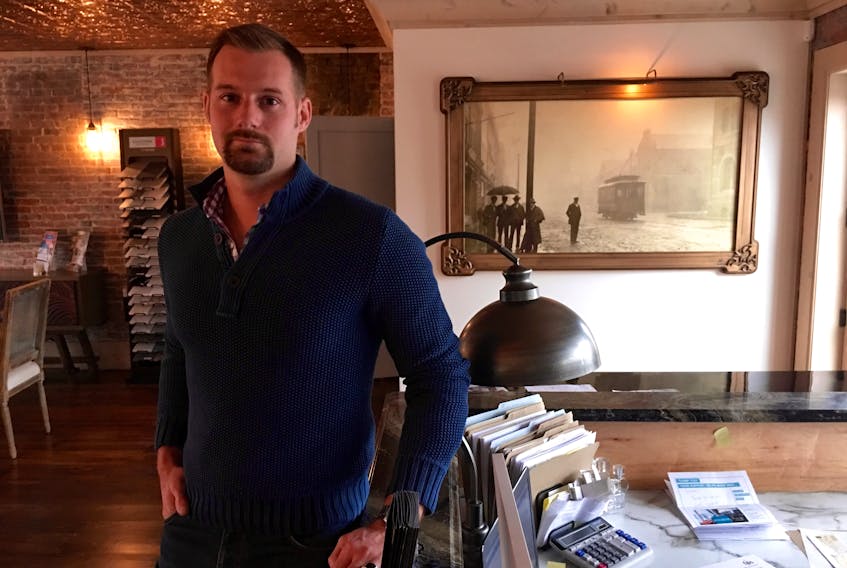YARMOUTH, N.S. – Dustin DuPrat got his first paycheck as a labourer at the age of 13 with one of his uncle’s companies.
Growing up in a rural area, he was either running through a farmers’ field or he was on a job site with a hammer in his hand. His farmers’ field days are behind him, but a hammer is never far away.
DuPrat was part of a ‘Meet the Innovators’ panel at a recent event at NSCC Burridge in Yarmouth called Innovation Fête, which attracted business people from throughout the province where innovation in Nova Scotia was celebrated and showcased.

DuPrat is a co-owner of the Yarmouth design firm RennDuPrat, which does building interior and exterior work and also focuses on building “phenomenal custom-tailored pieces of furniture and cabinetry,” he said. (Visit the RennDuPrat Facebook page.)
“For us innovation means a lot,” said DuPrat. “It means everything from developing patents and increasing efficiencies to investing in automation that actually helps capitalize our profit.”
The most important part of innovation, he said, is nothing they do is ever to the detriment of their employees.
Because when it comes to innovation, the talent of people tops the list.
At RennDuPrat they’ve cross-trained staff on equipment that some people may perceive as equipment that replaces employees due to automation, but DuPrat said it’s the opposite. He said they invest in this equipment so their employees’ time can be freed up, allowing them to be more creative when it comes to their work.
“Each and every one of our employees at RennDuPrat has a skill set that compliments the other, they’re all widely talented,” he said. “Without that ability to express their creativity on a regular basis not only would they die as people, as employees, as creative individuals, but their craft would die and we at RennDuPrat would be doing a disservice for the industry and really we would be perpetuating that stereotype that crafts people are nothing more than general labourers.”
Rather the result, he said, is a business, just three years old, that is offering unique products to its customers.
“We’ve got a business model and an exemplorary product and service all because of implementation, innovation, investment and, more than anything, a simple and respectful theory that these people, these craftspeople, should be able to do what drives their passion. Everyday their heart and soul goes into what they do.”

BEER AND BUBBLES
Heart and soul are something the staff at Boxing Rock Brewing Co. in Shelburne know all about.
Henry Pedro wasn’t always a brewer, nor, growing up in Toronto, did he ever expect to be. When he ventured east to find a new home he also went looking for a new job.
Not finding a job to his liking, he decided to make one instead.
He got together with a partner named Emily Tipton who already lived in Shelburne. They put their heads together and said let’s build something.
The questions, of course, were what and how? A brewing company was the answer, which they designed from the ground up. (VISIT THE BOXING ROCK WEBSITE)
Is that innovation, Pedro said? Probably not, since they were making a product that had already existed for a very long time.
“Innovation had happened already, but the way we did it, we thought maybe there would be a better way to go about it,” he said.
And so they looked at problems that brewers face every day and decided to tackle the hardest one – carbonation.
“Putting the bubbles in the beer is difficult. It’s difficult to do well. It’s difficult to repeat. It’s difficult to get right,” Pedro said.
And so sometimes a beer is too fizzy. Or it’s too flat. The answer to more consistent carbonization existed. They just needed to find it.
“We know what we’re shooting for, we know what we need, we know that it has to be at a certain pressure and we know it has to be at a certain temperature. How are we going to figure this out?” With help from Guy Tipton they eventually found the solution through the automation route.
The first device was crude – “Imagine a little steel box that looked like a beaver had chewed holes in it, with things hanging off of it and electronics attached to it with duct tape inside of Tupperware,” Pedro said. Not only did it work, but, he said, “It was bloody awesome!”
“This thing actually did the job it was supposed to do, it got carbonation levels that were darn near perfect.”
The eventual result was a device called the FizzWizz that is now sold to brewers all over the world.
“I’m really proud of this because this is our innovation. We helped other brewers get their beer right,” Pedro said, adding there is always going to be a problem to solve in a brewery.
And at Boxing Rock not only are they up for the challenge, they welcome it.

GEARING UP AN IDEA
It’s sort of the same type of place Scott Dauphine found himself in years ago. The Yarmouth County resident was looking for an existing business to tap into – one that was already up and running and had all the systems and personnel in place.
But it didn’t happen.
So instead of turning to an existing business, he turned to an existing industry.
And where is there a big industry in Atlantic Canada? He needed to look no further than the lobster industry. And, he decided, why not introduce something different to the industry.
“Now we have a product – the plastic lobster trap,” he said, explaining it’s been two-and-and-a-half years in the making and they’ve gone through all of the stages that a business would – finding and starting a company, seeking out great mentors, exploring processes, coming up with prototyping, etc.
The result is a plastic lobster trap created by the Lobster Trap Company that, after much work, Dauphine hopes to start taking orders for and manufacturing next year. A selling point will be the longevity of the trap with its projected life span of at least 10 years.
But it’s taken a lot of work to get here.
“When we built our first prototype we were issued an experimental licence from DFO where we could fish the traps but we weren’t allowed to keep the lobster,” he said. “We set up an experiment to fish the traps and that was really a turning point for myself. When we pulled the traps up and they had lobster in them.” It was an unbelievable feeling. They went back to the wharf. They had a trap. They had lobster. Now what?
“I said this is just the beginning,” he recalled, saying while it worked for them they were not fishermen. And that’s where the real work began – getting input from their potential customers who told them: We need this. We don't need that. This will work. That won’t work.
“The expertise is actually in the customer,” said Dauphine during the panel discussion. After all, innovation doesn’t always happen by yourself.
“My advice to any entrepreneur is keep an open mind, move with your product and listen to your customer because they’re going to decide where you’re going to go.”









